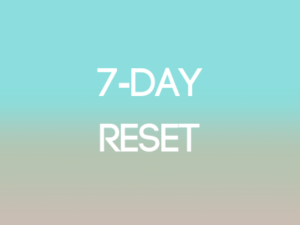
If you have ever learned, read, or watched anything else from me, you probably are a little bit surprised to hear this headline.
You might think, “Is she just being cute? Going for shock value with the headline, maybe?”
Because I typically preach the value of a slow, steady, long-term approach towards weight-loss.
Nope, it’s not a gimmick.
It’s also not going back on all I believe about the importance of small changes that add up over time. I still believe this slow, steady approach to weight-loss is absolutely best for when we’re looking at long-term strategies (i.e., keeping the weight off forever).
But here’s the thing.
If something is off in one of our body’s processes, it affects everything else.
Our bodies are integrated beings; they’re so interconnected that if something is out of balance in one area, this can have this whole domino effect.
So, if we’re not taking proper care of each critical component of how our body operates, that means there might be some low-hanging fruit when it comes to weight-loss that, once corrected, could cause you to shed weight right away.
My “Magic” Weight-Loss Tweak
Okay, so are you ready to hear how I honest-to-goodness dropped a pant-size in 3 days?
We’re getting there! But first, here’s a little bit of the back story.
I was going through a lot of stress in my job last year, looking for another day job while working 20 hours a week on my side hustle. A lot of things were piling up. We were also knee-deep in the adoption process, and if you know anyone who’s ever adopted, you know there are lots of paperwork headaches. I had to go back to the doctor’s to get bloodwork done for the process… for the third time. (But who’s counting? I digress.)
So, I was going through a lot of stress at that time. I remember going into that doctor’s appointment and having my weight taken, and feeling like my jeans weren’t fitting like normal. It was frustrating to me, because I hadn’t changed my diet.
I was eating pretty well. I was exercising. So, why was I suddenly feeling like my jeans were a little uncomfortable?
So, here’s what I did. Are you ready? Listen in.

For 3 nights in a row, I went to bed a full 90 minutes earlier.
That’s it.
Now, is that possible every single night? Of course not, but it happened to be at a time my husband was traveling for work. I had not made commitments to anyone else and I had to get on my own case to get off my perfectionistic tendencies and call it a night when my work was done (or, rather, before my work was done) and go to bed early.
Boom. My jeans fit. I was comfortable again. I had that nice flat tummy that I had become accustomed to.
So why sleep?
Cortisol and sleep are very closely connected. When you’re going through a lot of stress, that increases the hormone cortisol in your body, and cortisol has a slew of things that it touches—one of them being sleep.
Increased cortisol decreases the quality of our sleep, but decreased sleep also increases our levels of cortisol—creating a vicious cycle.
The digestive system is also affected by cortisol. High levels of the stress hormone (whether brought on by lack of sleep, or only exacerbated by the restless sleep that being stressed can cause) triggers an inflammatory response.
This inflammatory response then inhibits proper digestion, which can cause temporary bloating.
We need cortisol to stay alive, but most of us are exposed to it in such high doses, that it’s creating unnecessary weight gain.
It also stands to reason that when you’re undergoing high levels of stress, the body requires more sleep to repair the inflammation and restore the body’s regulatory processes.
But the times that we’re crazy-stressed are precisely the times we tend to sleep less.
Furthermore, long-term, chronic sleep deprivation keeps your cortisol levels in perpetual overload, which signals your fat cells to store excess body fat in the abdominal region.

So you’re not only retaining water and inflamed when you’re going through short bouts of stress, but over a long haul that cortisol can actually lead you to a higher concentration of body fat in the tummy.
Not to mention that when you’re not getting adequate sleep, your metabolism starts sinking.
Oh yeah, and
As if that’s not enough, when you’re stressed OR sleep deprived (or both, as we already know they go hand in hand), you actually start to crave more carbohydrates, fats, and sugar.
You create less of the hormone leptin, which otherwise signals to let you know when you’re full, and you create more of your hormone ghrelin, which cues you to be have a false sense of hunger.
Reasons Why You Should Be Getting Good Sleep
So, there are many reasons you should be getting good sleep.
Now, in my case, I actually wasn’t binge-eating or doing anything different with my diet.
But just the fact that I was under stress itself was leading to that inflammation and water retention, making me not feel super rock-star-ish in my clothes.
So by incorporating a little bit of extra sleep I was able to combat those stress hormones more fully to ward off all the regulatory processes that weren’t being able to get done during the day, because they were too busy being allocated towards dealing with inflammatory responses. The result? I was able to lose the weight, just like that.

Every part of the body is connected. Weight management is impacted by health habits besides just exercise and nutrition. Our bodies are whole, integrated beings.
In fact, there was a study done by the Canadian Medical Association Journal in which they tracked people who were on a fitness regimen.
They had identical diets AND identical fitness plans. The only thing that changed between the control group and the experimental group was that some of them got five hours of sleep or less, and some of them got eight hours of sleep.
Those who got eight hours of sleep lost far more weight than those who were going on five hours or less, even though their diet and exercise habits were identical.
Sleep could be your missing ingredient.
There are a whole host of processes and habits that could be impacting your hormonal function, throwing your body out of balance, and keeping you from working smarter–not harder–when it comes to your weight-management.
When you can identify those habits that keep your body in better balance overall, your whole body will thank you—including your waistline!
Need some help winding down for an early bedtime tonight? Try my free 15-minute gentle yoga video to lull you into dreamland!





